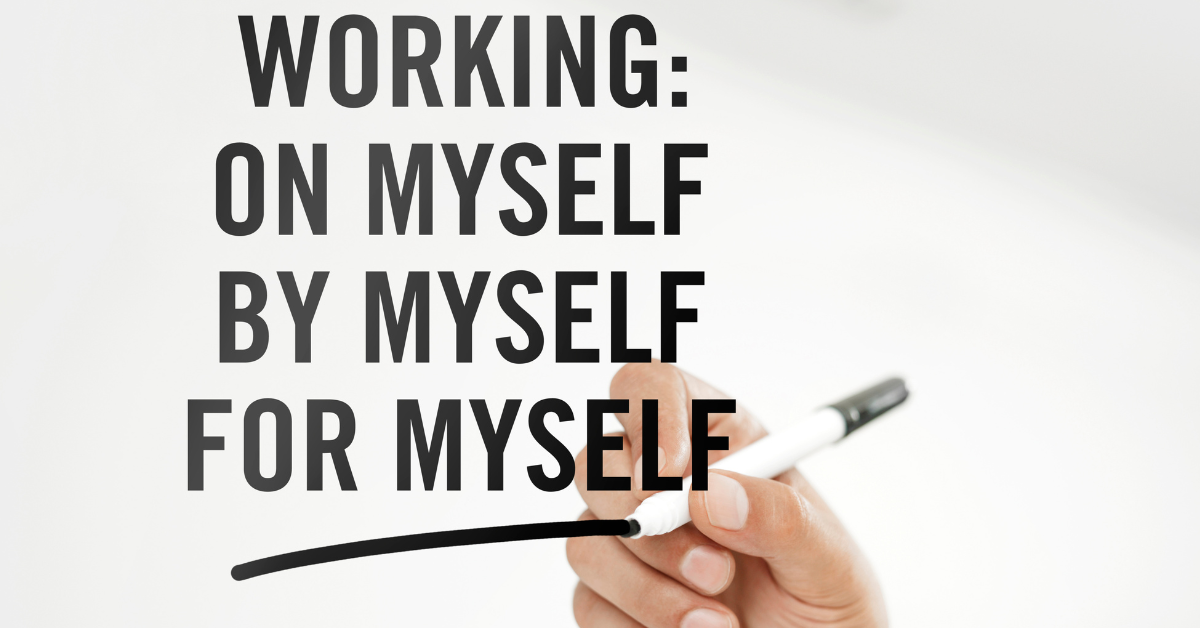Have you ever stopped questioning how deeply you are committed to yourself?
We all want to feel emotional fulfillment and if it means we have to commit to someone: we do that. It’s fine up to here.
It might sound like “obviously I am”: how else would you engage yourself in a commitment, with someone else or with some corporation, unless you would be committed to your goals?
Not so fast, young lady/young man: might not be that transparent. It might not be a direct correlation.
Actually, if what is external to you is more important than what is inside you, you might be abandoning yourself and, therefore, uncommitted with yourself.
You might be committing to everything else – your friends, your family tradition, the social standards of your environment, others’ expectations – but yourself.
That, my friend, is not self-commitment: that is self-abandonment.
Self-abandonment and the fear of being abandoned: the intimate relation
It might sound like a paradox, but people who have a big fear of not feeling approved or, in other words, fear of being abandoned by: friends, family, social environment, and counterparts… are the first to practice abandonment: on themselves.
It sounds cruel, nobody would do this to themselves. Not consciously, of course: but that’s what happens often.
It’s life delivering what your energetic vibration is communicating intensely: your biggest fear. Your hidden energetic fingerprint.
The fear of being abandoned.
The roots of fear of abandonment
Everything that is born eventually dies. People, relationships, jobs, projects, animals, plants. Except for energy, which is transformed: everything else dies.
Those are rules of nature: we might as well find peace with that.
Sad. True. Natural.
Some people have a hard time with that, suffer from the fear of abandonment and develop anxiety when facing the idea of losing people.
And that rooted fear, that anxiety, might lead them to accept the unacceptable, do whatever it takes to please others, tolerate toxic relationships, develop social masks to make sure that they are accepted by others, and favor others' expectations about them.
It becomes a way of being. People who suffer from fear of abandonment do all that for others so that they can diminish the chances of being abandoned, and feeling inherently rejected.
The roots of this fear are often related to childhood trauma: somewhere during your childhood, you felt deep emotional abandonment.
And the coping mechanism you’ve found to survive that feeling of abandonment was tuning out.
Operating outside of yourself, so you wouldn’t feel the pain within.
And what others need, feel or say became your reference: more important than you.
Your center became the others.
Your temperature barometer became the others.
Your life became the others.
But you are still the one who suffers for landing your power into others' hands. And that’s painful, cruel, and unfair.
Because your life has meaning because you exist: and you should be the center of your life. For better and for worse.
And that should be your first holy oath, your very first commitment as an adult: the commitment with yourself.
You might as well take your power back and stop abandoning yourself.
How can you know if you are self-abandoning yourself, to cut the cycle?
The first sign of self-abandonment is that you don’t feel fulfilled in your life.
If you feel unhappy or unsatisfied with your life is because somehow: you are not honoring yourself.
Everybody has problems, and yes there are challenging moments in life, but they are supposed to pass, you are supposed to overcome them.
If you look back in your life and see a sequence of phases, choices that had been made, that lead you to what it appears to be a cycle of the same things, the same results of unfulfillment, only with different characters: you need to address something.
And normally it is you.
# Manifastations of self abandonment
When you have the habit of abandoning yourself, it usually shows up, it manifests in life as these:
- You are frequently involved in toxic and codependent relationships
- You don’t honor your needs
- You don’t speak your mind and suppress your feelings
- You constantly seek validation from others (people-pleasing) and let others decide for you
- You run over your core values
- Your self-criticism is demolishing
No. Stop right there. You are not damaged for good.
And stop again: don’t put the focus on others, blaming everyone else around.
Because it takes two to waltz.
# The useful approach: improve the relationship with yourself
The useful and constructive approach would be: to let me learn more about myself and stay committed to what I’ll learn, so I can make better choices that will lead me to more fulfillment in life.
There’s always room to improve.
Money is important. But so is your relationship with yourself, which will manifest in your relationship with others.
And you do wanna have it all, right? You want to have the full cup.
In order to have it all: you must stay committed to yourself, before any commitment to anyone else.
Staying committed to yourself: the tools
This could be summed up in two words: values and goals.
And this can be done on your own, with a coach or a therapist. It all depends on your personal needs.
Because if we're talking about codependence or trauma: a therapist might be of value for your situation.
If it’s discovering what are your core values and defining your goals: a coach might be a valuable alternative to consider.
# Staying commmited to yourslef: you have to know what are you committing to
When we talk about goals are both broader and deeper than financial prospects: they are supposed to be about life's purpose.
Is overall goals: is relationships, is professional, is health (mental and physical), hobbies, and entertainment that builds you. Is overall.
And how else can you define goals that are worth fighting for, protecting, and going after, unless they are backed up by your personal values?
And personal core values are really personal. Is what you value at a deeper value: is not the same for everyone.
And that’s why we shouldn’t let others' words about us and our life have more value than our own: because their values might not match ours.
# This said: how do you stay commited to you yourslef? (instead of constantly abandoning yourslef)
1. Find out what your core values are: sometimes is not obvious
It might take some hours but it pays back: you find the silver lining in the outcomes. Because you start making decisions having your values in mind. And that will minimize inner conflict between what you do and what you value.
Make sure that you have a list of 5-10 core values. Hierarchy. It makes decision-making easy and you prioritize what really matters.
2. Make sure that your goals are aligned with your core values
You’ll find it very challenging, and worse than that: frustrating.
If you are pursuing a goal that is not aligned with your course values. The feeling will be of cheating on yourself. Self-betrayal. The worst kind of betrayal. As if you’ve fallen into your own self-made trap.
You’ll want your goals to be aligned with your core values. The outcome?
- a victory that tastes good, a victory that taste like a real victory
- your hard work has meaning and gets balanced: it won’t feel like you lost yourself during the process
- instead of the feeling of shame and unworthiness of whatever gain (material or intangible) you have: you’ll feel proud of yourself
3. Act aligned with your core values
What you do matters. Even if no one is watching: you are your very first witness.
Nobody is perfect. You might stumble: instead of punishing in self-shame: upgrade, improve, and make better next time.
Acting aligned with your values builds self-confidence.
Is as if your core values ask you to say you’ll be there. And your actions say yes, your actions confirm it.
4. Do your goals scare you? Be brave and keep going
Let’s face it: it might feel like a mountain to move. It's scary and that’s ok. Just do it anyway.
It doesn’t matter what others believe: what matters is what you believe in.
Stand for what you believe. Stand for you.
And believe in yourself: if it’s in your mind, it’s possible.
5. Be focused: don’t let distractions around you lose focus on your goals
Some people come into our lives to teach us lessons.
Some people enter our lives and are nothing but distractions. Especially if they are leading us astray.
They have their own goals, that aren't necessarily aligned with yours: which makes them a distraction.
Enjoy the present moments and, simultaneously: stay focused. Keep your goals in mind.
6. Be authentic
In a world where fake is being celebrated and rewarded: it might be a temptation, it might seem the easiest way.
It may appear to others as an act of rebellion when you dare to be authentic.
But you get to have real relationships. And those are more fulfilling.
It doesn’t mean you have to be unpleasant to others or say everything that comes up to your mind: there are many things that we say out of anger: and then regret and aren't necessarily true.
Being authentic means that you defend what you believe to be true.
It means knowing when to say “No”, and sticking to it.
It means valuing your word: you mean what you say and say what you mean.
Getting Better Every Day
Committing Hugs
From Body&Soul!
References and Related Posts
https://bodyandsoulbizz.co.uk/years-passed-and-still-feel-that-taste-of-rejection-overcome-it/
https://www.livewellwithsharonmartin.com/self-abandonment-what-it-is-and-how-to-stop/~
10 Things You Need To Commit Yourself To If You Have Low Self-Esteem - Lifehack
https://bodyandsoulbizz.co.uk/you-are-unique-as-unique-as-is-your-hierarchic-list-of-values/
https://bodyandsoulbizz.co.uk/like-a-mountain-to-moveits-time-to-become-your-best-friend/
https://bodyandsoulbizz.co.uk/appreciation-and-hate-how-to-deal-with-it/
Hey! I'm Eunice Veloso and you'll find more about me on my About Page
"In nature, nothing is lost, nothing is created, everything is transformed"
Antoine Lavoisier, 1789
The Law of the Conservation of Mass

